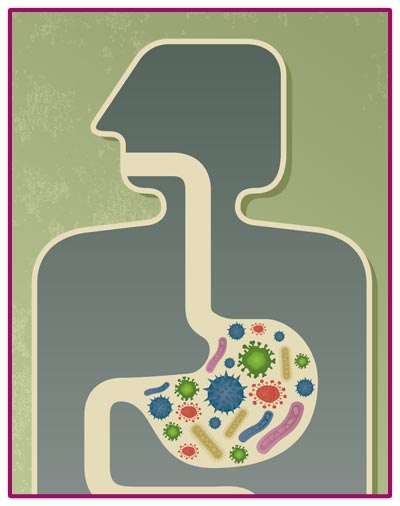
Most Americans today live a very high stress life- style. Between school, work, families, and other responsibilities, the average American is dealing with a full plate of things that need to be done. What most people don’t realize is how high stress and poor diet really affect their digestive health. Inside everyone’s digestive tract is gut microbiota, also known as gut flora. Gut microbiota are non-harmful microorganisms that live inside the G.I tract and help the body to digest foods in the stomach and small intestine. Gut microbiota are also a key tool to ensure proper digestive functioning, assist the immune system, help fight off bad bacteria and microorganisms, and help with the production of vitamins B and K. People don’t realize there are trillions and trillions of these microorganisms in our digestive systems helping us to digest and absorb food to help us stay healthy. So what can help this beneficial gut flora do its job? The answer is probiotics.
Probiotics are a hot topic lately, popping up regularly in commercials, ads, grocery stores, and doctors’ offices. Probiotics are a food or supplement that contains live beneficial microbes, primarily bacterial strains, which help to fortify or rebuild the natural gut flora in the body. If there is not enough intestinal flora in the body though, a person could experience symptoms of digestive problems, IBS, and obesity. Having gut flora in the body also metabolizes and recycles hormones such as estrogen and thyroid hormones, which help fix symptoms involved with menopause, PMS, and a hormonal imbalance. Gut flora also helps to fight off bad microorganisms that may cause digestive issues that can be associated with constant problems like bloating and constipation. Consuming probiotics in either supplement form or through food sources helps to create a good environment for gut flora.
Foods such as sauerkraut, yogurt, kefir, and homemade pickles are great examples of foods containing active cultures and beneficial bacteria. Good intestinal flora help regulate bowel movements, prevent bloating, gas, and yeast overgrowth by controlling PH levels of the intestine through the production of lactic acid. Beneficial bacteria help the mucosal barrier of the intestines to help prevent toxins and allergens from harming the body. Another big issue that most people don’t realize is that when they are prescribed an antibiotic for an infection the antibiotic does it job to kill everything. Everything meaning good or bad gut bacteria. To regain the good bacteria in our digestive system it is important to consume a probiotic (in food or supplement) to ensure the gut flora is stable and doing what it needs to be doing to keep our digestion and overall health to the best it can be.
Health professionals suggest to take a probiotic from a flora imbalance if you experience conditions such as: G.I sensitivity, cramping, bloating, IBS, migraines, acne, irritability, fatigue, anorexia, increased PMS symptoms, sensitivity to sugar and fermented products, and inflammatory conditions.
References
Pick, M. (2014). Probiotics-For Life! Retrieved September 24, 2014, from http://www. womentowomen.com/digestivehealth
(2014). Everything you always wanted to know about the Gut..Retrieved September 22, 2014, from http://gutmicrobiotawatch.org







